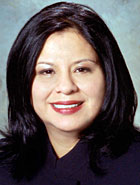Consuelo Castillo Kickbusch, a retired U.S. Army lieutenant colonel, education activist, and entrepreneur, spoke to students Monday about how to become an effective leader in today’s America.
Castillo Kickbusch told students that leadership is about authenticity, transparency, and passion. To become an effective leader, she said, students must align themselves with what they love.
Using her own journey as an example of what students can accomplish, Castillo Kickbusch spoke about being raised in the border town of Laredo, Texas. She explained that because of her Zip code teachers had her on track to go into the service industry and discouraged her pursuit of higher education.
But she refused to be pigeonholed, and after graduating from Hardin-Simmons University, Castillo Kickbusch entered the U.S. Army as an officer and would later become the highest-ranking Hispanic woman in the army’s Combat Support Field. At the height of her army career, Castillo Kickbusch retired to become an education activist and community leader.
At the height of her army career, Castillo Kickbusch retired to become an education activist and community leader.
Castillo Kickbusch stressed the importance of community and making a difference on a local level. She cautioned students that their education was a gift, not a license to dismiss others, and urged them to remember where they came from.
“Love yourself,” she said. “Come to terms with the entirety of your life. You can not know where you’re going until you understand where you’ve been.”
Castillo Kickbusch urged the students to return to their communities and help others achieve the level of success they have reached.
She also stressed the importance of building unity within larger communities by building relationships. Though everyone is part of a group, everyone is also an individual with their own story, journey, and identity. Castillo Kickbusch told students to be inclusive, to approach others with open minds and open hearts
Castillo Kickbusch walked throughout the ALANA Cultural Center meeting room as she spoke, engaging students in one-on-one conversation.
“I think her no-holds-barred approach really allowed students to connect with her” said Kathryn Meng ’09.